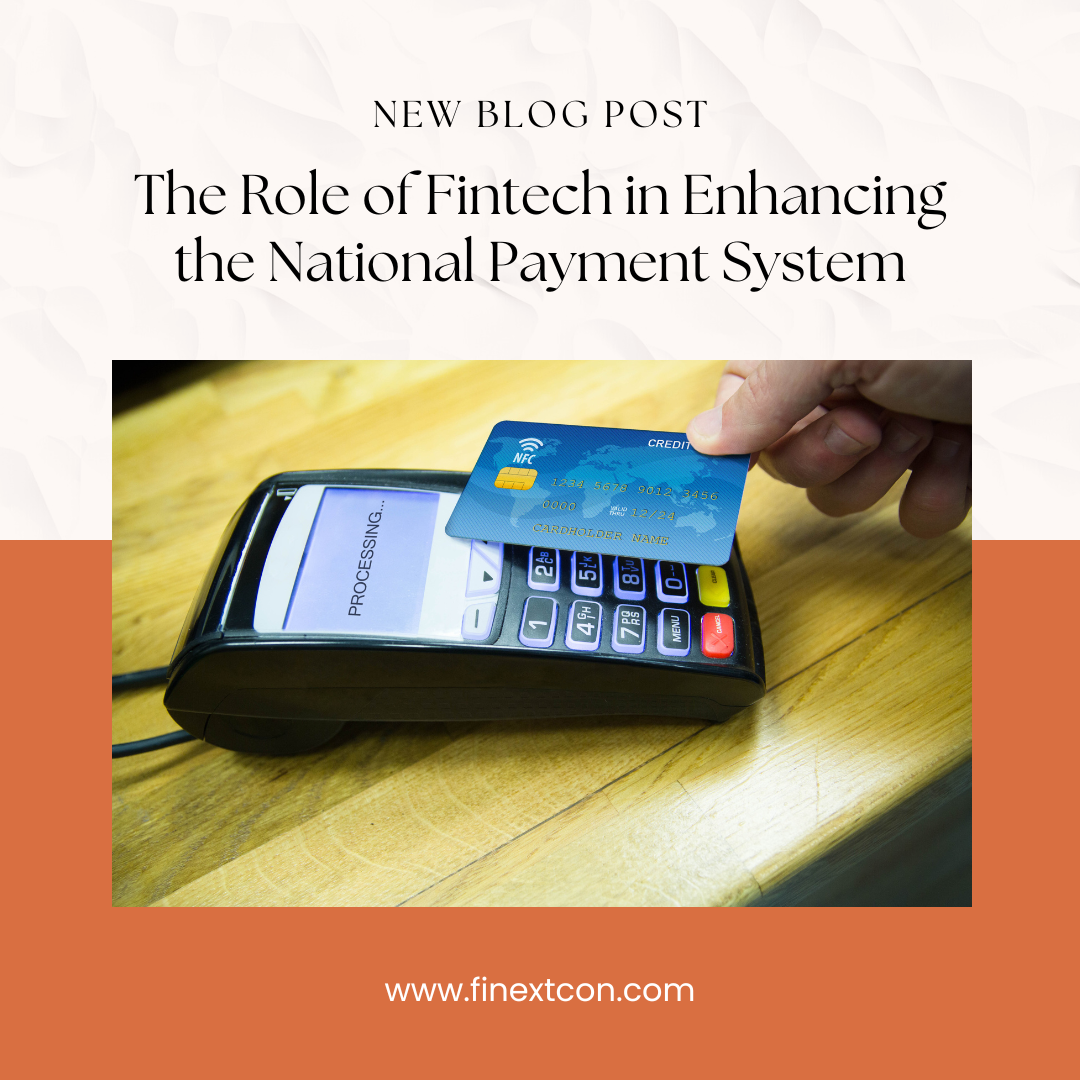Top 5 Fintech Innovations to Watch in 2025
Tag: Fintech Conference in MENA
Exploring the Top Fintech Companies in the UAE: Driving Innovation and Growth
Exploring the Top Fintech Companies in the UAE: Driving Innovation and Growth
The Evolution of Fintech Partnerships: From Competition to Collaboration
The Evolution of Fintech Partnerships: From Competition to Collaboration
The Role of Fintech in Enhancing the National Payment System
In the modern financial landscape, the advent of financial technology (fintech) has profoundly impacted the way we conduct transactions, manage finances, and perceive money. One of the most significant areas where fintech has brought about a revolutionary change is the national payment system. This blog delves into the crucial role fintech plays in enhancing the national payment system, its benefits, challenges, and the future outlook. Understanding the National Payment System The national payment system (NPS) encompasses the set of instruments, procedures, and rules used to transfer funds between entities within a country. It is a crucial component of the financial infrastructure, ensuring the efficient and secure movement of money. A robust NPS is essential for economic stability, facilitating trade, investment, and overall economic growth. The Rise of Fintech Fintech, a fusion of finance and technology, leverages innovations like blockchain, artificial intelligence, and big data to offer enhanced financial services. Its rise has disrupted traditional banking and payment systems, introducing new ways of conducting transactions that are faster, more secure, and more inclusive. Enhancing Efficiency and Speed One of the most notable contributions of fintech to the NPS is the significant improvement in efficiency and speed. Traditional payment methods often involve multiple intermediaries, leading to delays and higher costs. Fintech solutions, such as peer-to-peer (P2P) payment platforms and digital wallets, streamline the process, reducing the time taken for transactions to mere seconds. For instance, real-time payment systems like the Unified Payments Interface (UPI) in India have revolutionized how money is transferred, allowing instant bank-to-bank transfers 24/7. This not only enhances user convenience but also boosts economic activities by ensuring funds are available immediately for further transactions. Promoting Financial Inclusion Fintech has played a pivotal role in promoting financial inclusion, particularly in developing countries. Traditional banking systems often exclude large segments of the population, especially those in rural areas or with low incomes. Fintech bridges this gap by providing accessible and affordable financial services through mobile phones and the internet. Mobile money services like M-Pesa in Kenya have brought millions into the financial system, enabling them to save, borrow, and transfer money without needing a bank account. By integrating more people into the formal financial system, fintech strengthens the NPS and contributes to overall economic growth. Enhancing Security and Transparency Security and transparency are paramount in any payment system. Fintech innovations have significantly bolstered these aspects through technologies like blockchain and biometrics. Blockchain, for example, offers a decentralized ledger system that ensures transparency and reduces the risk of fraud. Biometric authentication methods, such as fingerprint and facial recognition, add an extra layer of security to financial transactions, minimizing the risk of unauthorized access. These advancements not only protect users but also enhance trust in the NPS, encouraging more people to adopt digital payment methods. Challenges and Considerations Despite its numerous benefits, the integration of fintech into the national payment system is not without challenges. Regulatory frameworks need to evolve to keep pace with technological advancements, ensuring that fintech innovations do not compromise… Continue Reading The Role of Fintech in Enhancing the National Payment System
The Rise of Fintech Companies in MENA: Transforming Financial Landscapes
Introduction The Middle East and North Africa (MENA) region is undergoing a significant transformation driven by the rapid rise of fintech companies. These innovative enterprises are leveraging technology to revolutionize financial services, enhance accessibility, and promote financial inclusion across the region. In this blog, we explore the factors driving the fintech boom in MENA, key players, and the impact on the financial landscape. The Driving Forces Behind Fintech Growth 1. Young, Tech-Savvy Population MENA boasts a predominantly young population that is highly tech-savvy. With increasing smartphone penetration and internet access, this demographic is eager to adopt digital financial services, creating a fertile ground for fintech innovation. 2. Government Support and Regulatory Reforms Governments in the MENA region are actively fostering fintech growth by implementing supportive policies and regulatory frameworks. Initiatives like regulatory sandboxes, fintech hubs, and favorable licensing conditions are encouraging startups and investors to enter the market. 3. High Unbanked Population A significant portion of the MENA population remains unbanked or underbanked. Fintech companies are addressing this gap by offering accessible and affordable financial solutions, from mobile wallets to digital lending platforms, thus promoting financial inclusion. 4. Investment and Collaboration The region has seen a surge in investment in fintech startups, with venture capitalists and financial institutions recognizing the potential for substantial returns. Collaborations between traditional banks and fintech firms are also driving innovation and expanding the reach of digital financial services. Key Players in the MENA Fintech Ecosystem 1. PayTabs PayTabs, a Bahrain-based payment solutions provider, is a prominent player in the MENA fintech landscape. The company offers secure and seamless online payment processing, catering to businesses of all sizes across the region. 2. Fawry Egypt’s Fawry is a leading electronic payment network, providing a wide range of financial services, including bill payments, mobile banking, and e-commerce solutions. Fawry’s extensive network of retail locations makes it a critical player in promoting digital financial services. 3. Souqalmal Based in the UAE, Souqalmal is a financial comparison platform that empowers consumers to make informed financial decisions. The platform offers comparisons of banking, insurance, and investment products, enhancing transparency and competition in the financial sector. 4. Sarwa Sarwa, a robo-advisory platform from the UAE, is democratizing investment by offering affordable and accessible wealth management services. The platform leverages technology to provide personalized investment portfolios tailored to individual risk profiles and financial goals. Impact on the Financial Landscape 1. Enhanced Financial Inclusion Fintech companies in MENA are playing a crucial role in bridging the financial inclusion gap. By offering digital banking, payment solutions, and microfinance services, they are empowering previously underserved populations to participate in the formal economy. 2. Increased Efficiency and Innovation The integration of technology in financial services is streamlining operations, reducing costs, and enhancing efficiency. Fintech firms are driving innovation in areas such as blockchain, artificial intelligence, and machine learning, setting new standards for the industry. 3. Competition and Consumer Empowerment The rise of fintech is fostering healthy competition in the financial sector. Traditional banks are compelled to innovate… Continue Reading The Rise of Fintech Companies in MENA: Transforming Financial Landscapes
The Benefits of Subscription-Based Card Processing Services
In today’s digital age, businesses are increasingly shifting towards subscription-based models to streamline operations and enhance customer experience. Subscription-based card processing services are a prime example of this evolution, offering numerous advantages over traditional per-transaction fee structures. Here’s a closer look at the benefits of adopting a subscription-based card processing service for your business. 1. Predictable Monthly Costs One of the most significant benefits of subscription-based card processing is the predictability of costs. Traditional card processing services often come with fluctuating fees based on the number and size of transactions. This can make budgeting challenging for businesses. In contrast, subscription-based models offer a fixed monthly fee, allowing businesses to predict and manage their expenses more effectively. 2. Lower Overall Fees Subscription-based models can lead to lower overall processing costs, especially for businesses with high transaction volumes. By paying a flat monthly fee, businesses avoid the cumulative costs of per-transaction fees, which can add up quickly. This cost-saving aspect makes subscription services particularly attractive for growing businesses looking to optimize their operational expenses. 3. Simplified Fee Structures Traditional card processing services often come with complex fee structures, including interchange fees, assessment fees, and various markups. Subscription-based services simplify this by offering a straightforward pricing model. This transparency helps businesses understand exactly what they are paying for, eliminating the confusion and frustration associated with hidden fees and unexpected charges. 4. Enhanced Customer Support Subscription-based card processing providers typically offer superior customer support as part of their service. With a stable revenue stream from subscriptions, these providers can invest more in customer service resources, ensuring that businesses receive timely and effective support. This can be a significant advantage for businesses that rely heavily on card transactions and need prompt assistance to resolve any issues. 5. Scalability As businesses grow, their transaction volumes and processing needs evolve. Subscription-based card processing services are designed to scale with your business. Whether you’re processing a few hundred transactions a month or tens of thousands, these services can accommodate your needs without the hassle of renegotiating fees or upgrading plans frequently. This scalability ensures that your card processing solution grows alongside your business. 6. Improved Cash Flow Management With a predictable monthly fee, businesses can better manage their cash flow. Knowing exactly how much they will be spending on card processing each month helps in planning and allocating resources more efficiently. This improved cash flow management can be crucial for businesses, especially small and medium-sized enterprises, to maintain financial stability and support growth initiatives. 7. Access to Advanced Features Many subscription-based card processing services offer access to advanced features and tools that can benefit businesses. These may include detailed transaction analytics, fraud detection, and prevention tools, and integrations with other business systems. By subscribing to these services, businesses can leverage these tools to optimize their operations, enhance security, and gain valuable insights into their transaction data. Conclusion Subscription-based card processing services offer a compelling alternative to traditional per-transaction fee models. With predictable costs, simplified fee structures, enhanced customer… Continue Reading The Benefits of Subscription-Based Card Processing Services





